University Sport South Africa (USSA) is a leading African delegation in the University Sports world. U-Media Reporter Chidiebere Ezeani caught up with USSA President Ilhaam Groenewald to get an insight into the strategy and structure that has fueled the FISU Member Association’s success.
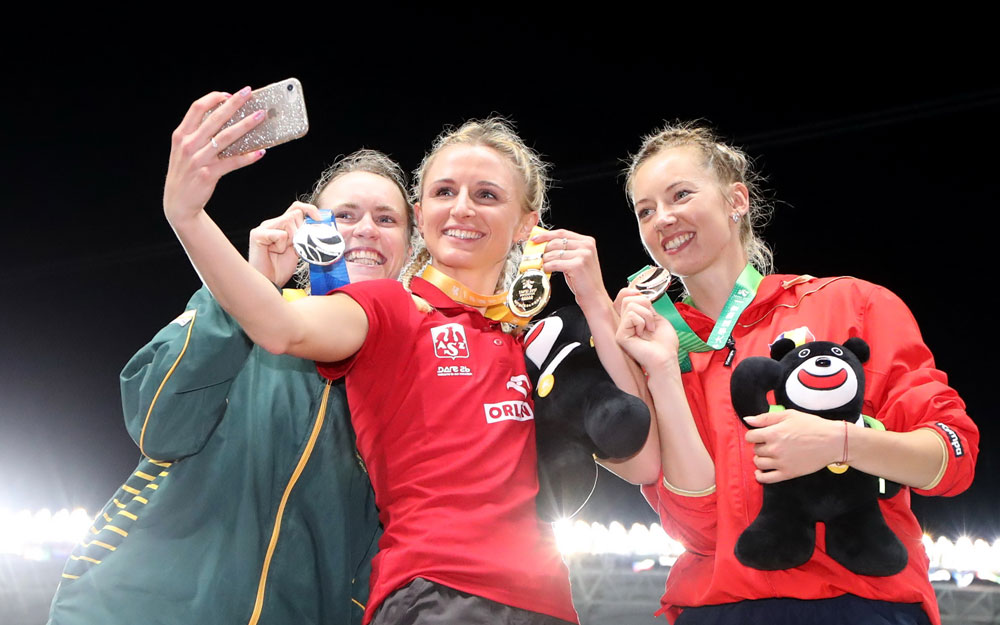 USSA’s Justine Alframan celebrates her silver medal in the Women’s Athletics_400m final with Poland’s gold medalist Nata Malgorzata and Romania’s Bianca Denisa Razor.
USSA’s Justine Alframan celebrates her silver medal in the Women’s Athletics_400m final with Poland’s gold medalist Nata Malgorzata and Romania’s Bianca Denisa Razor.
It was a memorable year for the University Sports in South Africa, congratulations on your new position.
Thank you and it remains a great honour and privilege to serve University Sport and sport in my country.
South Africa was a remarkable and able representative of Africa at the 29th Universiade in Taipei last year. Let’s talk about the achievements of the association this year.
We started our journey as overall champions of the CUCSA (Confederation of University and Colleges Sports Associations) Games in 2016.
During the 29th Summer Universiade, we won 5 silver medals, placing us 44th (in the overall medal table) and although our target was 10 medals, which we missed a few times by split seconds, we are happy that we won medals after all.
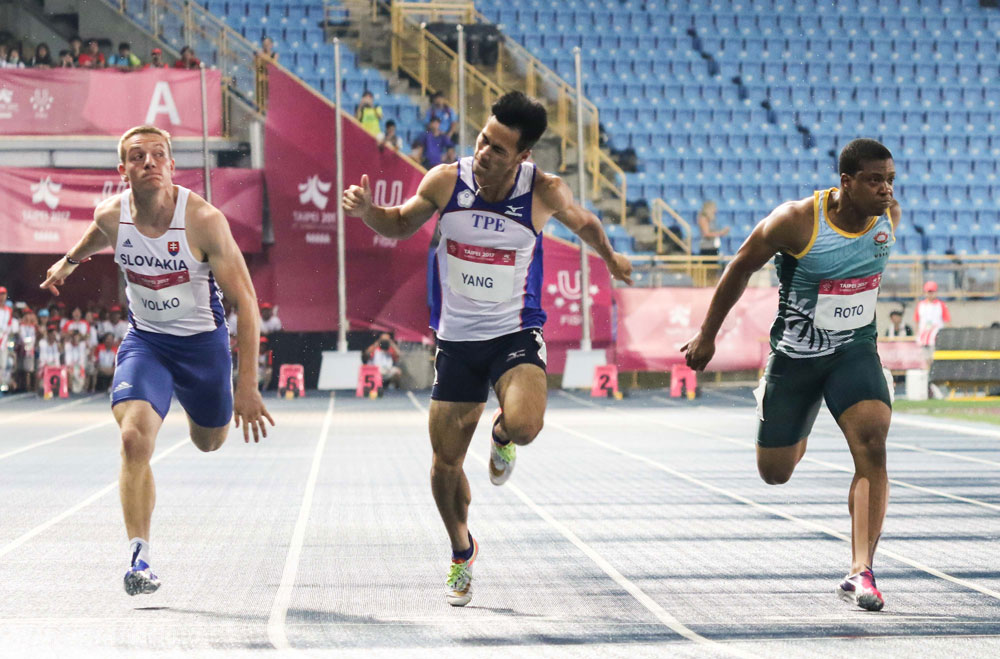 USSA’s Thando Roto (right) finished second to Team TPE’s Chun-Han Yang (centre) in the 100m finals at the Taipei 2017 Summer Universiade.
USSA’s Thando Roto (right) finished second to Team TPE’s Chun-Han Yang (centre) in the 100m finals at the Taipei 2017 Summer Universiade.
The leadership of the USSA has recently changed hands, how important is it to stay on the track already established by the previous board.
It is always important to continue the race, noting that our new Executive was elected a few months prior the 29th Universiade, and we needed to focus on the successful delivery of this project. This was possible, due to the work of the previous leadership and staff, ensuring that the ship stays put and to have a continued focused on achieving our objectives.
USSA has a consistent and well-respected system of administration, management and governance; therefore the change in leadership has minimal impact on our core business. The staff at the USSA Office plays a critical role to ensure smooth transition and continuity.
What are the necessary changes and additions to the association you intend to implement?
We are due to have our strategic planning workshop during the first week of December 2017, however some of the key factors already identified include financial sustainability through commercial opportunities, leadership development, revisiting our competition formats and a continued focus to strengthen our various governance structures.
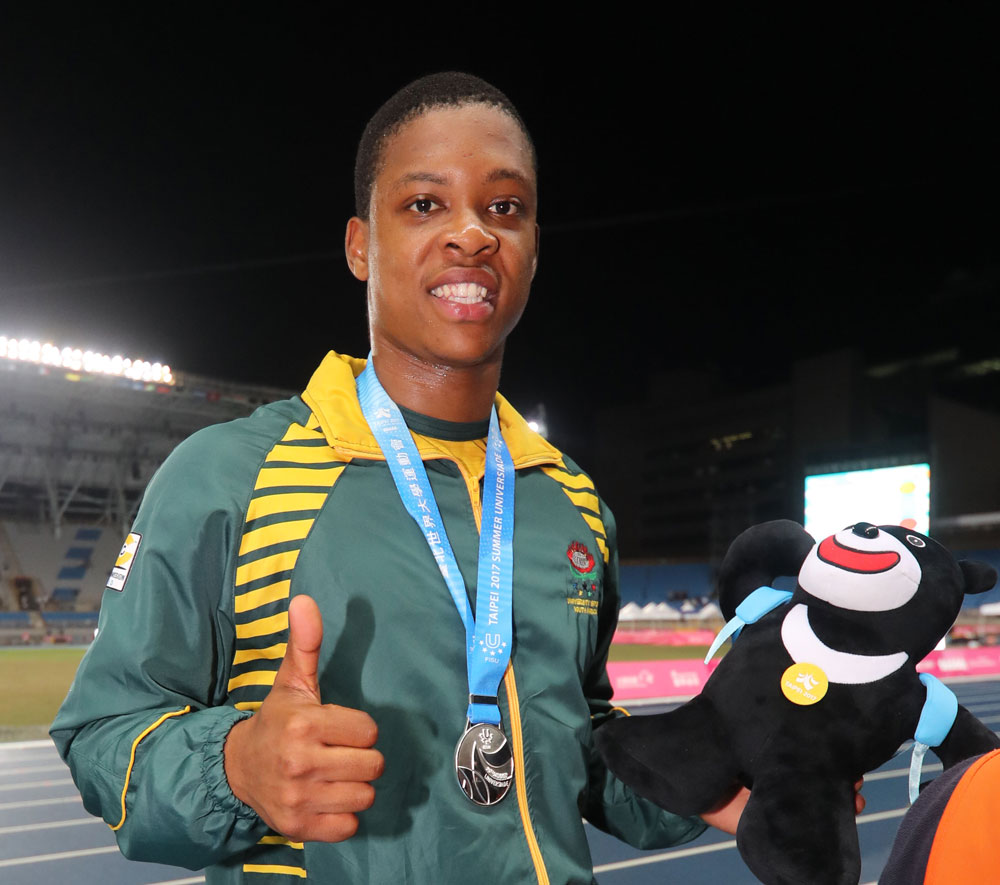 In addition to Thando Roto, USSA has had a lot of recent success in Athletics, including Akani Simbine setting the 100m Universiade Record of 9.97 seconds at the Gwangju 2015 Summer Universiade.
In addition to Thando Roto, USSA has had a lot of recent success in Athletics, including Akani Simbine setting the 100m Universiade Record of 9.97 seconds at the Gwangju 2015 Summer Universiade.
South Africa has been on the front burner of University Sports, especially on the global stage. What do you think the rest of Africa can do to match this?
There are some of the key factors for any organization, that are no different for sport. These include:
- Leadership: A diverse and committed team with proper levels of accountability and this means ongoing monitoring, evaluation and reporting.
- Personnel/staff: Always ensure that your head office remains intact. Take care of staff, because leadership changes and ultimately it is permanently employed staff who will continue the race.
- Strategic planning and funding your plan: This is probably a challenge for most university sport structures, therefore without a committed member university senior leadership and sport family, it will not be possible to have a long-term vision that is mainly funded by universities.
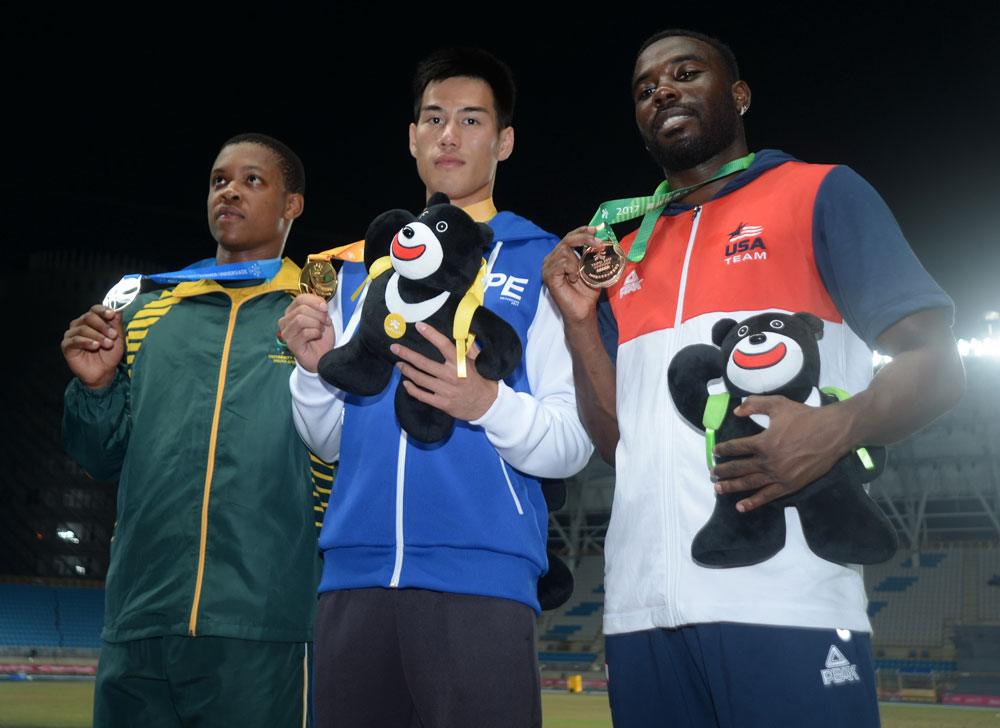 Thando Roto was another South African athlete who performed well in Taipei, winning a Summer Universiade medal in the 100m dash. Roto was joined on the podium by Chun-Han Yang of Chinese Taipei and Cameron Burrell from the USA Team.
Thando Roto was another South African athlete who performed well in Taipei, winning a Summer Universiade medal in the 100m dash. Roto was joined on the podium by Chun-Han Yang of Chinese Taipei and Cameron Burrell from the USA Team.
It is public knowledge that the USSA is interested in future hosting the Summer Universiade as early as 2025/2027 and also hosting World University Championship events. What is the reasoning behind this, which would be a milestone for university sports in Africa?
We have been discussing hosting opportunities for a while now, so it is time for action! Short to medium milestones will be the hosting of World University Championships, leading up to and allowing us to prepare for the ultimate, the hosting of a Summer Universiade.
The reason behind this is to use this as a platform to position and market University Sport better and key to this is that South Africa has the experience, expertise and infrastructure to achieve these dreams.
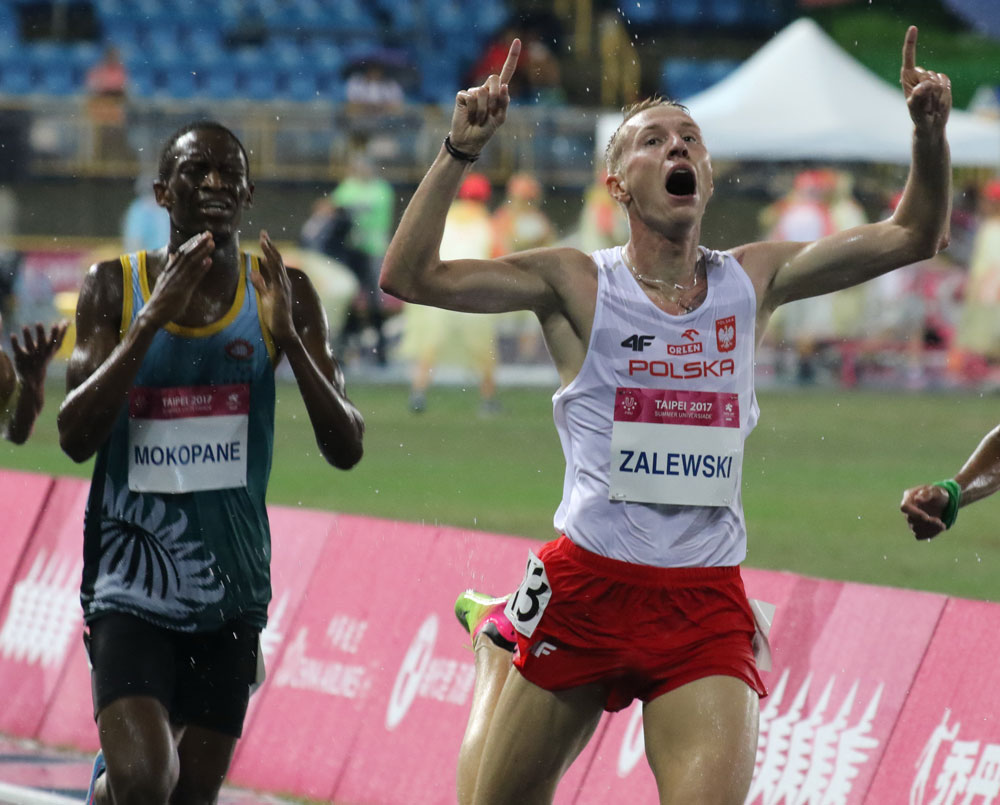 USSA’s Rantso Alfred Mokopane finished second in the 3000m steeplechase at the Taipei 2017 Summer Universiade to Kristin Zalewski of Poland
USSA’s Rantso Alfred Mokopane finished second in the 3000m steeplechase at the Taipei 2017 Summer Universiade to Kristin Zalewski of Poland
Finance has always been the major issues for University sports bodies in Africa, what is USSA doing when it comes to generating funds?
Our business model has been a very stable process; however this is an area we have identified as critical to change, noting our higher education challenges and its impact on subsidy income, which in turn impacts on overall university operations such as sport.
Our current income is based on member university contributions; national government (sport & recreation) subsidy, partnership with University Sports companies, National Lotteries Commission (specifically for the Summer Universiade), and the hosting of our national university championships.
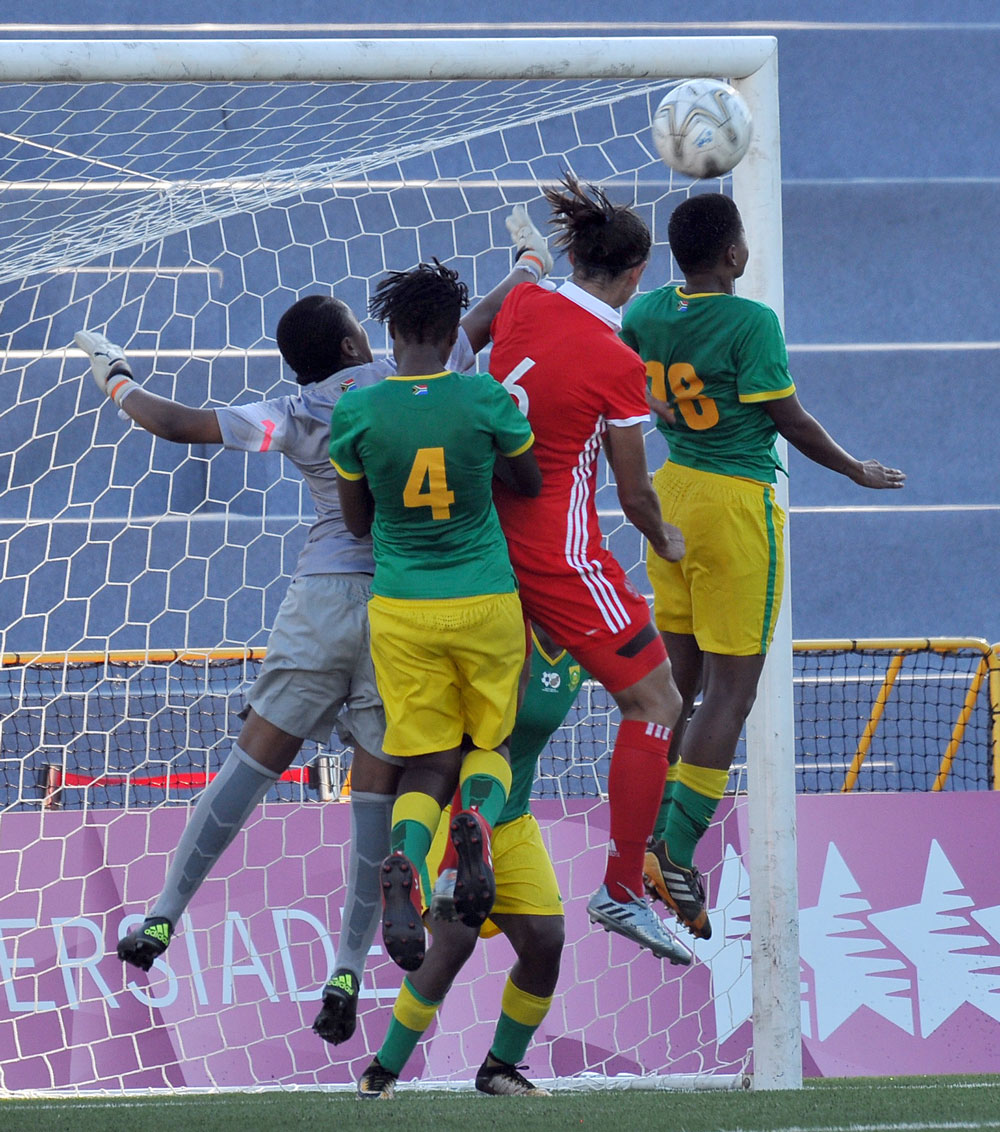 The South African delegation takes on Russia in Women’s Football at the Taipei 2017 Summer Universiade
The South African delegation takes on Russia in Women’s Football at the Taipei 2017 Summer Universiade
How important is the next Federation of Africa University Sports (FASU) Games for the development of athletes for SA looking up to 2020 Olympics?
Participation within Africa, for both the FASU and the CUCSA Games, remains one of our focus areas. This is not only as a build up to competition such as the Olympics, but to also strengthen University Sport in Africa. Our athletes, coaches, and support staff consider these Games as important, and we have recently shared our thinking on this with our Olympic structure as part of their qualifications criteria.
Noting that university sport continues to contribute and strengthen South African sport with instances where we have student representation of up to 60 percent in some sports and or teams. It is, however, important that we collaborate more in our country, and have a shared-model that will result in even better performances.
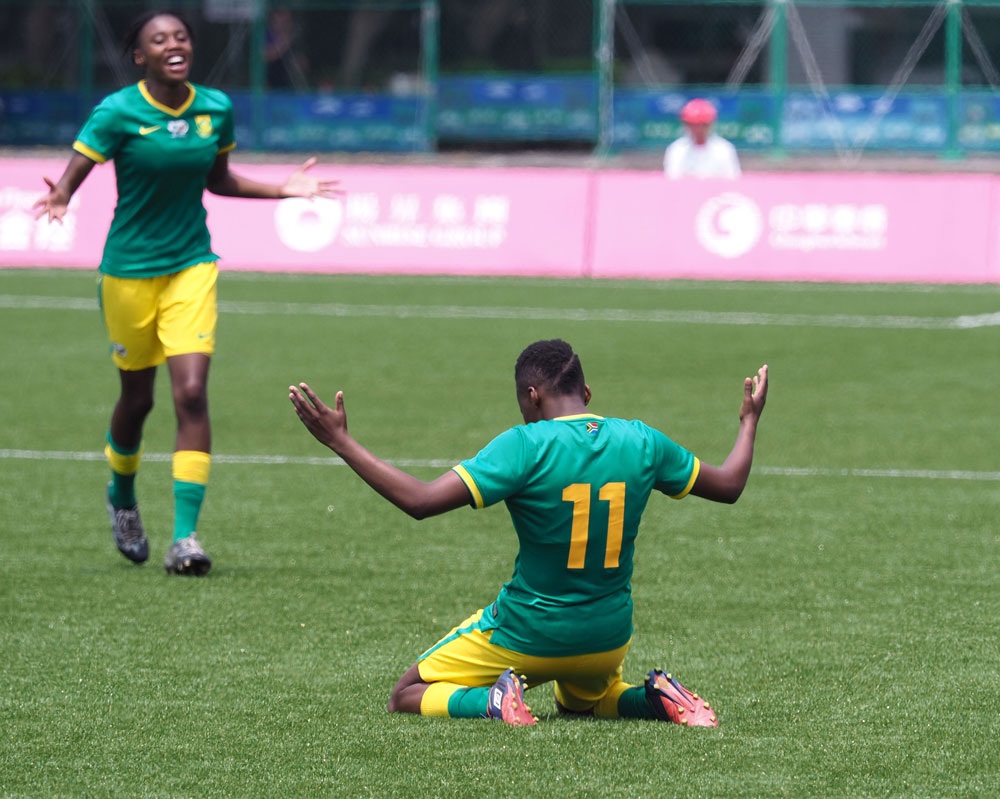 Kgatlana-Thembi (left) and Kgatlana Thembi celebrate after a scoring a goal against Russia in Women’s Football at the Taipei 2017 Summer Universiade
Kgatlana-Thembi (left) and Kgatlana Thembi celebrate after a scoring a goal against Russia in Women’s Football at the Taipei 2017 Summer Universiade
Do you have any final thoughts on University Sport?
Universities must continue to invest in research and development, innovation, and re-creation, and this is necessary, noting the ongoing and rapid changes in the business of sport. We also need to have a well-informed understanding on how and where we should improve and this means we need to be action-orientated with a disruptive mindset.
It cannot be business as usual, therefore important that we ask ourselves what is it that we are going to stop doing and do differently to ensure the continued growth of university sport. This means that we must be willing to change our business to stay abreast.


